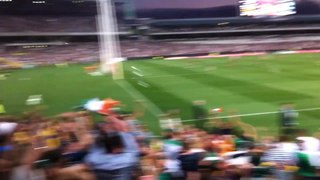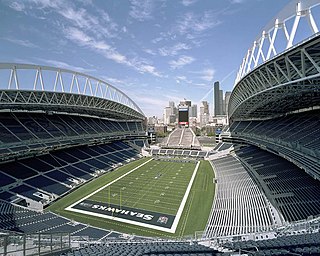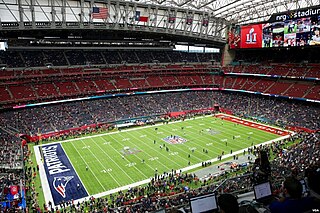
The wave is a type of metachronal rhythm achieved in a packed stadium or other large seated venue, when successive groups of spectators briefly stand and raise their arms. Immediately upon stretching to full height, the spectator returns to the usual seated position.

Lumen Field is a multi-purpose stadium in Seattle, Washington, United States. Located in the city's SoDo neighborhood, it is the home field for the Seattle Seahawks of the National Football League (NFL), Seattle Sounders FC of Major League Soccer (MLS), and Seattle Reign FC of the National Women's Soccer League (NWSL). Originally called Seahawks Stadium, it was renamed Qwest Field in June 2004 when telecommunications carrier Qwest acquired the naming rights. The stadium became known as CenturyLink Field following Qwest's June 2011 acquisition by CenturyLink and was nicknamed "The Clink" as a result; it received its current name in November 2020 with CenturyLink's rebrand to Lumen Technologies. It is a modern facility with views of the Downtown Seattle skyline and a seating capacity of 68,740 spectators for NFL games and 37,722 for most MLS matches. The complex also includes the Event Center which is home to the Washington Music Theater, a parking garage, and a public plaza. The venue hosts concerts, trade shows, and consumer shows along with sporting events. Located within a mile (1.6 km) of Downtown Seattle, the stadium is accessible by multiple freeways and forms of mass transit.

Arrowhead Stadium is an American football stadium in Kansas City, Missouri, United States. It primarily serves as the home venue of the Kansas City Chiefs of the National Football League (NFL). The stadium has been officially named GEHA Field at Arrowhead Stadium since March 2021, following a naming rights deal between GEHA and the Chiefs. The agreement began at the start of the 2021 season and ends in January 2031 with the expiration of the leases for the Chiefs and Royals with Truman Sports Complex owner, the Jackson County Sports Complex Authority.

NRG Stadium is a multi-purpose stadium in Houston, Texas, United States. Construction was completed in 2002, at a cost of $352 million and has a seating capacity of 72,220. It was the first NFL facility to have a retractable roof.

Husky Stadium is an outdoor football stadium in the northwest United States, located on the campus of the University of Washington in Seattle, Washington. It has been home to the Washington Huskies of the Big Ten Conference since 1920, hosting their football games. It also briefly hosted the Seattle Seahawks of the NFL in 2000 and 2001 while Qwest Field was being constructed.

Acrisure Stadium, formerly known as Heinz Field, is a football stadium located in the North Shore neighborhood of Pittsburgh, Pennsylvania, United States. It primarily serves as the home of the Pittsburgh Steelers of the National Football League (NFL) and the Pittsburgh Panthers of the NCAA Division I Football Bowl Subdivision in the Atlantic Coast Conference (ACC). The stadium opened in 2001 as Heinz Field, following the controlled implosion of the teams' previous home, Three Rivers Stadium. In 2021, the owners of the Heinz name, now owned by Kraft Heinz declined to renew the stadium's naming rights. The City of Pittsburgh green-lit Acrisure's bid to purchase the rights in 2022.

The Kingdome was a multi-purpose stadium located in the Industrial District neighborhood of Seattle, Washington, United States. Owned and operated by King County, it was best known as the home stadium of the Seattle Seahawks of the National Football League (NFL) and the Seattle Mariners of Major League Baseball (MLB); it was also home to the Seattle SuperSonics of the National Basketball Association (NBA) and additionally served as both the home outdoor and indoor venue for the Seattle Sounders of the North American Soccer League (NASL). The Kingdome measured 660 feet (200 m) wide from its inside walls.

Franklin Field is a sports stadium in Philadelphia, Pennsylvania, at the eastern edge of the University of Pennsylvania's campus. Named after Penn's founder, Benjamin Franklin, it is the home stadium for the Penn Relays, and the university's venue for football, track and field, and lacrosse. Franklin is also used by Penn students for recreation, intramural and club sports, including touch football and cricket; it is also the site of Penn's commencement exercises, weather permitting.

Cleveland Stadium, commonly known as Municipal Stadium, Lakefront Stadium or Cleveland Municipal Stadium, was a multi-purpose stadium located in Cleveland, Ohio. It was one of the early multi-purpose stadiums, built to accommodate both baseball and football. The stadium opened in 1931 and is best known as the long-time home of the Cleveland Indians of Major League Baseball (MLB), from 1932 to 1993, and the Cleveland Browns of the National Football League (NFL), from 1946 to 1995, in addition to hosting other teams, other sports, and concerts. The stadium hosted three AAFC Championship Games, six NFL Championship Games, served as one of the host venues of the 1948 and 1954 World Series to go along with being a four-time host of the Major League Baseball All-Star Game and the site of the original Dawg Pound, Red Right 88, and The Drive.
The 12th man or 12th player is a collective term for fans of sports teams in many eleven-a-side games, in particular association football or American football. As most football leagues allow a maximum of eleven players per team on the playing field at a time, referring to a team's fans as the 12th man implies that they have a potentially helpful and significant role in the game.
The use of music at sporting events is a practice that is thousands of years old, but has recently had a resurgence as a noted phenomenon. Some sports have specific traditions with respect to pieces of music played at particular intervals. Others have made the presentation of music very specific to the team—even to particular players. Music may be used to build the energy of the fans, and music may also be introduced in ways that are less directly connected with the action in a sporting event.
The 2010 NFL season was the 91st regular season of the National Football League (NFL) and the 45th of the Super Bowl era.
The vuvuzela is a horn, with an inexpensive injection-moulded plastic shell about 65 centimetres (2 ft) long, which produces a loud monotone note, typically around B♭ 3. Some models are made in two parts to facilitate storage, and this design also allows pitch variation. Many types of vuvuzela, made by several manufacturers, may produce various intensity and frequency outputs. The intensity of these outputs depends on the blowing technique and pressure exerted. The indoor noise level caused the U.S. NCAA to permanently ban them after the 7 February 1987 Division I Men's Ice Hockey game between the Brown Bears and the Rensselaer Polytechnic Institute Engineers. The noise was so extreme that Brown formally complained and "The RPI Rule" was universally adopted.

The term "behind closed doors" is used in several sports to describe matches played where spectators are not allowed in the stadium or venue to watch. The reasons for this may include punishment for a team found guilty of a certain act in the past, stadium safety problems, public health concerns, or to prevent potentially dangerous clashes between rival supporters.

Major League Soccer is the premier professional soccer league in the United States and Canada. Competition began in 1996 and attendance has grown rapidly since the early 2000s, making it one of the fastest-growing sports leagues in the world. The average attendance of 22,111 in 2023 was a 60% increase over the 13,756 average in 2000. The total attendance of 10,900,804 in 2023 is almost five times that of 2,214,978 in 2002. Similar to Major League Baseball and the National Hockey League, attendance is based on the number of tickets distributed.

Mercedes-Benz Stadium is a multi-purpose stadium in Atlanta, Georgia, United States. Opened in 2017 as a replacement for the Georgia Dome, it is the home of the Atlanta Falcons of the National Football League (NFL) and Atlanta United FC of Major League Soccer (MLS). The stadium is owned by the state of Georgia through the Georgia World Congress Center Authority, and operated by AMB Group, the parent organization of the Falcons and Atlanta United FC. In 2016, the total cost of its construction was estimated at US$1.6 billion.

SoFi Stadium is a 70,240-seat sports and entertainment indoor-outdoor stadium in the Los Angeles County suburb of Inglewood, California, United States. SoFi occupies the former site of the Hollywood Park Racetrack, 0.15 miles (0.24 km) southeast of the Kia Forum, 0.2 miles (0.32 km) northwest of Intuit Dome, and 3 miles (4.8 km) from Los Angeles International Airport.
The 2020 NFL season was the 101st season of the National Football League (NFL). The regular season started with the NFL Kickoff Game on September 10, in which defending Super Bowl LIV champion Kansas City defeated Houston. The playoffs were expanded from 12 to 14 teams, adding a third wild card spot per conference. The season concluded with Tampa Bay defeating Kansas City in Super Bowl LV at Raymond James Stadium in Tampa, Florida, on February 7, 2021.

The COVID-19 pandemic has caused disruption to gridiron football across the world, mirroring its impact across all sports. Across the world and to varying degrees, leagues and competitions have been cancelled or postponed.













